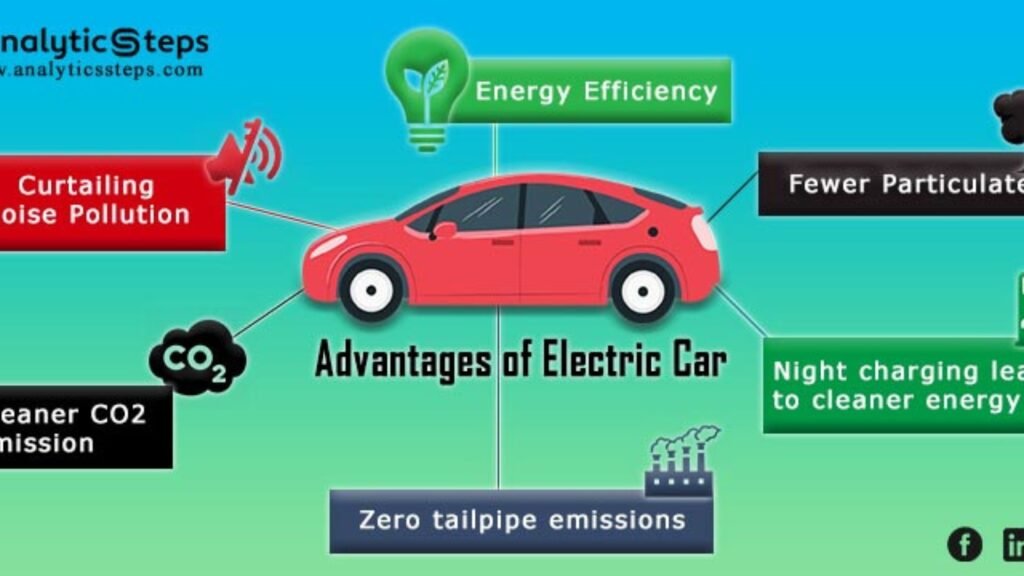Eco-Friendly Benefits of Electric Vehicles
Electric vehicles (EVs) are becoming more popular as people become aware of their numerous eco-friendly benefits. Unlike traditional gasoline-powered cars, electric vehicles offer a cleaner, more sustainable way to travel. These benefits go beyond just reducing pollution—they also contribute to better public health, lower carbon footprints, and a more sustainable future for our planet.

Reducing Air Pollution
One of the most significant eco-friendly benefits of electric vehicles is their ability to reduce air pollution. Traditional vehicles emit a variety of harmful gases, including carbon monoxide, nitrogen oxides, and particulate matter, which contribute to poor air quality. These pollutants can cause respiratory issues, cardiovascular diseases, and other health problems, especially in urban areas where traffic is dense.
Zero Tailpipe Emissions
Electric vehicles produce zero tailpipe emissions, meaning they don’t release harmful pollutants into the air. By switching to EVs, we can significantly reduce the amount of toxic gases in the atmosphere. This leads to cleaner air, particularly in cities, improving the quality of life for everyone.
Lowering Greenhouse Gas Emissions
Greenhouse gas emissions are a major contributor to climate change, and reducing these emissions is crucial for protecting the environment. Traditional vehicles run on fossil fuels like gasoline and diesel, which release large amounts of carbon dioxide (CO2) when burned. This CO2 contributes to the greenhouse effect, trapping heat in the atmosphere and leading to global warming.
Sustainable Energy Sources
Electric vehicles can be powered by renewable energy sources such as wind, solar, and hydroelectric power. When EVs are charged using these clean energy sources, their overall carbon footprint is much lower than that of vehicles powered by fossil fuels. This shift to sustainable energy is essential for reducing greenhouse gas emissions and slowing the pace of climate change.
Promoting Energy Efficiency
Another eco-friendly benefit of electric vehicles is their energy efficiency. Electric motors are more efficient than internal combustion engines, which means they use less energy to travel the same distance. This efficiency translates into less energy consumption overall, which is beneficial for the environment.
Regenerative Braking
Many electric vehicles also use regenerative braking, a technology that captures and stores energy typically lost during braking. This stored energy can then be used to power the vehicle, further increasing its efficiency and reducing the need for additional energy from external sources.
Reducing Noise Pollution
Electric vehicles are not only better for the environment in terms of emissions but also help reduce noise pollution. Traditional vehicles with internal combustion engines are noisy, especially in urban areas where traffic congestion is common. This constant noise can be harmful to both mental and physical health, leading to stress, sleep disturbances, and hearing loss.
Quieter Streets
Electric vehicles operate much more quietly than gasoline-powered cars. Their electric motors produce very little noise, making city streets quieter and more peaceful. This reduction in noise pollution can improve the quality of life in urban areas and create a more pleasant environment for residents.
Supporting Sustainable Development
The shift to electric vehicles also supports broader goals of sustainable development. By reducing reliance on fossil fuels and minimizing environmental damage, electric vehicles help pave the way for a more sustainable future. This transition is aligned with global efforts to meet environmental targets, such as the Paris Agreement, which aims to limit global warming to below 2 degrees Celsius.
Boosting the Green Economy
The growth of the electric vehicle industry also stimulates the green economy by creating jobs in renewable energy, battery production, and EV manufacturing. This economic shift helps reduce unemployment and promotes a more sustainable economy that prioritizes environmental protection.
Reducing Dependence on Fossil Fuels
Electric vehicles also contribute to reducing our dependence on fossil fuels, which are finite resources. By transitioning to EVs, we can lessen our reliance on oil, reducing the environmental damage caused by oil extraction, refining, and transportation. This shift also enhances energy security by diversifying the sources of energy we use to power our vehicles.
Long-Term Environmental Impact
Over time, as more people adopt electric vehicles and renewable energy becomes more widespread, the long-term environmental impact will be profound. We’ll see a significant decrease in the demand for fossil fuels, leading to fewer oil spills, reduced deforestation for oil exploration, and less overall environmental degradation.
Conclusion
In conclusion, the eco-friendly benefits of electric vehicles are clear. From reducing air and noise pollution to lowering greenhouse gas emissions and promoting sustainable development, electric vehicles are a key component of a greener, more sustainable future. By making the switch to electric vehicles, we can all contribute to a cleaner planet and a healthier environment for future generations. The shift to electric vehicles is not just a trend—it’s a necessary step towards protecting our planet and ensuring a sustainable future.

